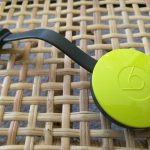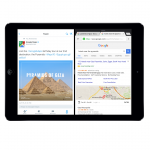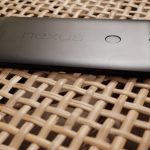Behind the big names, the first hires of major tech companies

We've all heard of Bill Gates, Steve Jobs and Mark Zuckerberg, but what about the people they hired in the early days of their fledgling businesses?
You probably don’t know anything about Marc McDonald's role at Microsoft or Shel Kapha's at Amazon, but these were among the first people hired by those companies and had a significant effect on their growth.
You don't need to read this review -- buy Chromecast 2015 instead

This is one of the easiest reviews to write—and the shortest, too. If you own an Android or iOS device, buy the new Chromecast. Nothing more needs to be said, but I am obliged because you do want to know why. Right?
Google opened up the streaming stick category with launch of the original Chromecast, in July 2013. Release of its successor, on Sept. 29, 2015, makes an already compelling platform better. I see two benefits that matter: WiFi AC support and the hanging dongle design. Wireless update primps the device for faster routers, like Google's own OnHub. The other is more crucial. Some people needing or wanting to plug into one of a TV's rear HDMI ports may find the original Chromecast won't fit. The new design, puck hanging from HDMI cable, solves that problem.
Google just made Chrome for iOS much better -- Split View and Autofill are here

As soon as I come home every day, the first thing I do is grab my iPad. My iPhone gets connected to the charger and then it is tablet time. While I use a lot of apps, the one I use most is Safari. Yes, on the device with the best apps, I spend a lot of time surfing the web.
While I am totally satisfied with Safari, I am open to trying an alternative. On both Ubuntu and Windows 10 I use Chrome, so maybe I should use Google's browser on my iPad too. Well, today, the search giant makes its browser much more attractive to iOS users. The iPad version now offers Split View for compatible devices, while all iOS devices gain Autofill.
Facebook takes on Google by making searching social and personal

Facebook is much more than just a social network; for many people it is the internet. For others, it is a source of news, and this is something that Facebook is quite happy to play upon. But what a lot of people are now looking for is not just news, but the reaction to news.
This is something that Facebook is well-positioned to provide a conduit for, and now the social network is looking to take on Google by giving more accurate and personal search results -- including tailoring search results according to what is currently happening in the world.
7 Android apps that have successfully adapted Material Design

Material Design -- the new(ish) design language introduced by Google in Android Lollipop, and inspired by 'paper and ink' -- aims to provide a unified experience irrespective of device fragmentation.
This was very much needed for a mobile first world, where the market for small screen devices (read wearables) is growing at a rapid pace.
Will you pay Google $10 per month for ad-free YouTube Red? I sure as heck won't be

Cord-cutters -- people that cancel their cable or satellite TV service -- often talk of the alternatives. Netflix and Hulu are two popular streaming video services, but don't forget about YouTube. If you are open-minded, you can actually discover a lot of great content on Google's video site . PewDiePie, for example, is brilliant; give him a chance, y'all.
Of course, the cool thing about YouTube is that it is free. Well, it does not cost money at least. You see, you pay by viewing the advertisements before, during, and after the content. The problem? Ad-blocking is rampant, so many viewers never even see these ads. Unfortunately, Google is launching a paid option called "YouTube Red" (ugh, terrible name). I know what you are thinking -- why is it unfortunate to have choice? Well, it is a slippery slope. If it proves popular (I don't think it will be), the search-giant could start charging for more services -- maybe as the only option. Google historically offers free services through advertising. This moves makes me wonder if the search-giant's "free" business model is realistically sustainable.
Google's Amazon Problem

I have long been a critic of the "Peak Google" argument because it is based on a flawed premise -- that deep engagement and consequently "brand advertising" are somehow a threat to Google's model of transactional engagement. While I strongly disagree with that line of reasoning, there are other threats that Google faces within the transactional realm.
Search advertising drives the vast majority of Google's revenue and the most profitable searches are frequently those that are made with the intent to purchase. These purchase-oriented searches are hardly monolithic but can broadly be categorized into B2B and C2B searches. C2B searches can be broken down further into products and services. Looking at taxonomy of transactional opportunities makes it clear that the threat from "deep engagement" is vastly overstated. Facebook is a great place to generate awareness but it's hardly a way to reach customers looking for something specific. Also, breaking down the gamut of transactional opportunities makes it easier to identify threats.
Nexus 5X first-impressions review

The question everyone should ask about Google-branded, LG-manufactured Nexus 5X: Who is it for? My first-impressions review primarily focuses on the answer. My wife is one person, and I am surprised. Because conceptually she steps down from the Motorola Droid Turbo, which by raw specs is the superior mobile. Budget buyers also should consider the 5X or anyone living the Google lifestyle or wanting stock Android.
The new handset course corrects last year's release blunder, when Google sized up to 6-inch screen with the Nexus 6, leaving many satisfied N5 owners in stunned silence followed by loud complaint. While a N6 fan, I agree: It is a huge phone that is overly large for the majority of prospective buyers. This year's solution is smart. Google released two smartphones: Nexus 6P, which while phablet-class is markedly more manageable in the hands than its predecessor; Nexus 5X, for people wanting something smaller and for N5 owners looking to upgrade.
Nexus 6P or iPhone 6s Plus?

If you asked me two months ago about using a Huawei smartwatch or smartphone, I would have scoffed. Yet, here I am doing just that. Timing on the latter is ironic. On Oct. 15, 2015, I bought a 128GB silver (and white) iPhone 6s Plus using Apple's 24-month finance plan, rather than paying in full up front. Huawei-made, Google-branded 64GB Nexus 6P arrived the next day for review. The following morning (the 17th), I hauled down to Apple Store and returned the iPhone for full refund. That act sums up my reaction to the new Android flagship running "Marshmallow".
I didn't expect to be so wooed by Nexus 6P, but Google got me by delivering superior contextual experience. This device, and Android 6, is all about context, starting with what for me is the killer function I couldn't part with: the fingerprint reader on the back of the phone. Picking up the device and placing my forefinger on the circular indentation wakes and unlocks the 6P. Wow-way is right! The mechanism beats the Hell out of Apple's two-handed jimmy from the Home button.
Nexus 6P first-impressions review

Finely balanced and contextually practical are the terms that best describe my first impressions of Google's flagship Android. Nexus 6P preorders are about to ship, and I was fortunate to receive a review model but with short embargo lift: Delivered Oct. 16, 2015 before every blogger and reviewer on the planet blasted out simultaneous reviews and first-reactions on the 19th. I choose the latter, because a scant three days isn't enough time to rightly evaluate the smartphone.
Much of my experience is cast in moving from the previous flagship, Nexus 6, although there was a day between them where iPhone 6s Plus and I fitfully danced. The 6P is in many respects what its predecessor should have been: Smaller. Much as I like the larger Motorola-made phablet, its Huawei-manufactured successor has greater physical and feature balance. Both are superb smart devices, but the newer Nexus is better tuned to practical purposes.
Court finds Google is not breaking the law by scanning books

Google's digital copies of millions of books from around the world has long been controversial. Copyright holders argue that in scanning their works, Google is breaking the law. This has been the focus of a court battle that has dragged on for ten years, but now an appeals court has ruled that Google is doing nothing wrong.
The book digitization project has been underway for some years, and has been the subject of litigation brought about by writers. Judge Pierre Leval and two other judges of the 2nd US Circuit Court of Appeals in Manhattan found that Google is not infringing copyright law, even when it digitizes books without the permission of the authors or publishers.
App Store revenue is 80 percent higher than Google Play

App Annie has released its mobile app market report for Q3, and the headline news is that Apple continues to make more money with iOS, whereas Google’s download numbers are increasing with Android.
It is, though, the money made which really counts, and the global indexed revenue from Apple’s App Store is now 80 percent higher than Google Play, according to App Annie’s figures.
Google Translate grows by two more language features

As much as you may want to know multiple languages, not everyone does. Fortunately for the rest of us there are translation tools to help out and Google is one of the more popular ones, plus it's available on multiple platforms.
Today Google rolls out new translation features, bringing English and German translations to Arabic via printed text -- conversations were already available.
Microsoft launches new Transparency Hub, details content removal requests

In the post-Snowden age, transparency reports are all the rage. After the privacy debate that followed the NSA surveillance revelations technology companies fell over themselves to publish everything they could about government data requests. Microsoft has already released transparency reports, but today unveils a new Transparency Hub.
This is designed to be a central resource through which a variety of reports can be accessed, including the Law Enforcement Requests Report and U.S. National Security Orders Report. Data for the first six months of 2015 is now available, and there is a new section dedicated to Right To Be Forgotten-style requests for data removal.
Hear the recordings Google stores of the voice commands you've said to your phone

OK Google, Siri, and Cortana all make it possible to control a phone simply by speaking to it. In the case of Google, what you might not be aware -- it's hardly something the company shouts about -- is that recordings of every command, question, and request are stored online.
Listening back through these could well be interesting, embarrassing, perhaps even nostalgic. You can step back in time and remind yourself of trips abroad, fun nights out, and the like, but you might also be concerned about privacy. If you would rather these recordings were not stored online, you can delete them; here's how.
Recent Headlines
Most Commented Stories
This updated Windows 11 clone is Linux underneath and makes your old PC run faster -- get it now
The brilliant Windows 12 is everything Windows 11 isn't -- and the Microsoft OS we deserve
Microsoft releases Windows 11 25H2 ISOs
Microsoft is rolling out Windows 11 25H2
BetaNews, your source for breaking tech news, reviews, and in-depth reporting since 1998.
© 1998-2025 BetaNews, Inc. All Rights Reserved. About Us - Privacy Policy - Cookie Policy - Sitemap.